

While stories of widespread data breaches, privacy threats and online vulnerabilities often dominate the news cycle, students with the Cyber Defense team at Catholic High School are learning the fundamentals in combating similar threats.
“Technology has taken over every business, every company, everything we do and it’s vulnerable and the ability to protect that is in high demand,” said Col. Charles Johnson, coach for the Cyber Defense team. “I think the critical-thinking, analysis, diagnosis of problems, the decision-making are just key life skills for anyone to have.”
There are 18 to 24 students on the team, with most having a knack for technology.
“I’ve always had a fascination with technology,” said junior Clarke Bowen, 17, who has been on the team for three years. “I grew up wanting to build my own video games … I’ve always liked to see how things tick.”
Senior Alex Clark, 18, is team captain and said he’s “leagues ahead” of where he started four years ago.
“The competitions are fun, but the dynamic of working with all the different people is probably what I’d say is the most fun,” Clark said.
Though cybersecurity can take many forms, the cut and dry of it is preventing a break in, “trying to secure your network so that other people can’t access things you don’t want them to access,” Clark said.
The Cyber Defense team follows CyberPatriot, a National Youth Cyber Education Program from the U.S. Air Force Association aimed at inspiring K-12 students to consider careers in cybersecurity or other STEM fields.
The CHS team, which meets once a week, practices for about six weeks until the first competition in mid-fall. Competitions, which include the practice round through national and international levels, run through the spring. There are three teams for Catholic High — Rockets, Gold and Purple — that are ranked by skill level.
“I always tell them this is not a hacking class, this is an anti-hacking class,” Johnson said. “They have to learn the techniques of a hacker in order to beat them, so I make them swear an oath that they’ll only use their powers for good.”
The web-based competitions, which mostly take place on weekends, last a maximum of six hours and place the teams of students in the role of IT professionals that must find “cybersecurity vulnerabilities within the images and hardening the system while maintaining critical services,” according to uscyberpatriot.org. Teams of about six work alone or in pairs with three different types of operating systems — Linux, Windows and Cisco — to compete in various security challenges.
“Since you’re going against people that do this for a living, that do this in the military, that lives could depend upon this, they know everything that you don’t,” said junior Alex Bromley, 17, of the people who create the competitions. “So you can do as much training as you want, but they’re professionals, this is their life, so you’re never going to be able to get it.”
During the 2017-2018 school year there were a total of 4,475 open division and all service division teams throughout the country and 77 in Arkansas.
“It’s primarily problem solving. To develop a checklist of the website and uncovering flaws, traps. It’s detective work in the cyber world so you have to be technologically proficient,” Johnson said.
Though the students enjoy competing, hands shot up at a chance to tell what stresses them out the most.
“No matter how hard you work, something is going to break. Just accept it. Something will break down and you’ll have to figure out what you did wrong,” Bowen said, recalling an incident that anyone who uses the internet can relate to — a forgotten password. “One thing we have to do for securing our users is to make sure they all have secure passwords. Well, on my team, we forgot to save the password outside the image and we accidentally crashed it. So we had to start all over.”
Last year, the team placed first in the state and ninth in regionals, narrowly missing the top eight spots that move onto national competition. Johnson said this year they placed fourth in the state.
Catholic High alum Dylan Hailey, 24, who attended Christ the King Church in Little Rock, started the team of three in 2009, later growing to about 50.
“It really helps you learn all kinds of fundamentals about technology in general and helps you become a more adept user,” said Hailey, who graduated in 2012.
Rather than just a fun extracurricular, the team quickly became a way toward a career in cybersecurity, which all three original members now work.
Hailey served as the team’s technical adviser, sometimes bringing students to commercial competitions as well, until moving to Santa Monica, Calif., in February. He is a senior security analyst for Activision Blizzard, an interactive entertainment company. He is searching for a replacement adviser, but still helps out remotely.
Jack Nichols, 16, a sophomore who wants to work in private civilian cybersecurity, said the most important lesson he’s learned from Hailey and the team is “anything that you put out on the internet is not safe at all. The old saying is that it’s out there forever, but also really any kind of technology has some sort of flaw. Because the internet was not made for security, everything is vulnerable.”
Freshman Anthony Hailey, 15, said his older brother Dylan is his “main inspiration” when it comes to cybersecurity.
“It is a booming industry, it’s not like just something that started in the 1800s, it’s something that’s relatively new so there’s a lot more to learn about it,” he said.
Even if a student has no desire to pursue cybersecurity, it helps them learn how to be secure online and prepares them for most technology careers.
“This team is a real connection to technology because we only have one other technology class at Catholic and that’s a programming class senior year,” said junior Max Rice, 16. “This is how I can really keep working and focusing on technology during school.”
Technical adviser Dylan Hailey said his work on the team can be directly traced to the opportunities he’s had in his career, including an internship with the FBI, consulting and his current job.
“If they win the competition it’s automatic job offers from companies that sponsor it,” he said, as well as college acceptance.
According to a 2016 Forbes.com article, the cybersecurity market is projected to grow to $170 billion by 2020, up from $75 billion in 2015. The U.S. Bureau of Labor Statistics said the median annual wage was $95,510 in May 2017, with the higher 10 percent earning $153,090. The projected growth for employment is 28 percent from 2016 to 2026, faster than the average for other occupations, the bureau cited.
In 2017, there were roughly 350,000 cybersecurity openings, according to CyberSeek.
“We had a very tough time finding people with the skills necessary for” cybersecurity, Dylan Hailey said he learned as a hiring manager. “There’s way more job openings than there are people to fill them. It’s very lucrative.”
Please read our Comments Policy before posting.
Article comments powered by Disqus CHS athlete overcomes odds to reach collegiate goal
CHS athlete overcomes odds to reach collegiate goal
 Rockets fill coach opening, keep things in the family
Rockets fill coach opening, keep things in the family
 Parochial schools can nudge some students to convert
Parochial schools can nudge some students to convert
 Papineau steps back after 20 years in parochial league
Papineau steps back after 20 years in parochial league
 The importance of saying 'yes' in your life and faith
The importance of saying 'yes' in your life and faith
 Don’t let misconceptions cause faith to waver
Don’t let misconceptions cause faith to waver
 Seniors, whatever storms may come, Jesus will be there
Seniors, whatever storms may come, Jesus will be there
 Studio 3:16 offers new approach to teaching religion
Studio 3:16 offers new approach to teaching religion
 After three decades, NLR principal plans to retire
After three decades, NLR principal plans to retire
 CHS athlete overcomes odds to reach collegiate goal
CHS athlete overcomes odds to reach collegiate goal
 St. Joseph a model of solidarity with immigrants
St. Joseph a model of solidarity with immigrants
 Two gifts after Jesus’ death: Virgin Mary and Eucharist
Two gifts after Jesus’ death: Virgin Mary and Eucharist
 Why we have an altar, and not just a communion table
Why we have an altar, and not just a communion table
 Pope: Wars should be resolved through nonviolence
Pope: Wars should be resolved through nonviolence
 Living relationship with Jesus Christ in the Eucharist
Living relationship with Jesus Christ in the Eucharist